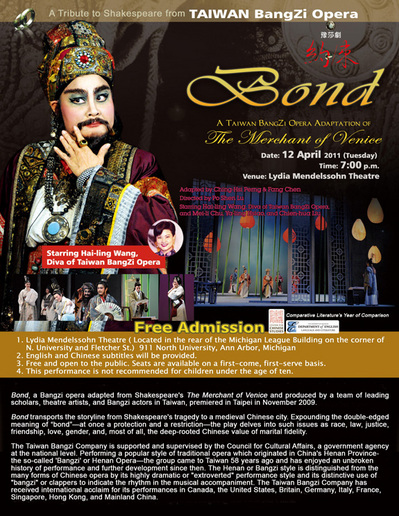Lessons from Taiwan Bangzi Company's Chinese Opera adaptation of Merchant of Venice, "Bond"

Taiwan Bangzi Company Chinese Opera adaptation of Merchant of Venice, "Bond," at University of Michigan last Tuesday | Flier courtesy of University of Michigan Center for Chinese Studies
I always love Chinese opera once I am there, but I have to drag myself in there because in my mind Chinese opera is categorized as “good for me.” Chinese opera is beautiful, stylized, and rich with meaning; but it is also layered with interpretation and code. My children wriggle their fingers at each other in the kitchen to show how Chinese opera singers represent anger.
But for “Merchant of Venice.”
I also love Shakespeare, but, again, resist it somewhat because it also falls into the “good for me” category. The language is beautiful, the meaning is not easy or obvious. My sixth-grade daughter Niu Niu recites, then laughs, “No, sir, I do not bite my thumb at you, sir, but I bite my thumb, sir.”
So the children and I leave the beautiful spring sunshine and rush into the cool darkness of Lydia Mendelssohn Theatre just before curtain where we meet under new names Bassanio, Antonio, Portia, Gratiano, Nerissa of medieval Cathay; and the (presumably pre-Islam) Saracen Shylock from distant deserts. I whisper a steady stream of plot and dialogue into 7-year-old Little Brother’s ear because he cannot yet read the supertitles.
From a University of Michigan press release:
“Bond” is based on a new translation of “The Merchant of Venice” by U-M alumnus Perng Ching-hsi (PhD ‘77), one of Taiwan’s foremost Shakespeare scholars and former dean of the National Taiwan University’s College of Liberal Arts. The opera, which originally premiered in Taipei in 2009, retains the story line of “The Merchant of Venice.” It transports audiences to a medieval Chinese city, and explores the double-edged meaning of “bond” — protection and restriction. The opera offers an updated, lyrical perspective on important issues such as race, law, justice, friendship, love, gender and, most of all, marital fidelity.
The virtues extolled in Portia’s “The quality of mercy is unstrained” and Shylock’s “Hath not a Saracen eyes” seem particularly lyrical in this ancient Chinese context. But soft, there are new songs, too.
Most poignant in this theater full of immigrants and the children of immigrants comes after Shylock has failed to obtain his pound of flesh, after he has lost all his hard-earned wealth, and after Antonio adds the additional requirements that he become a citizen of Cathay and lose “those outlandish clothes.”
Shylock then sings a new soliloquy about how hard it is to travel so far from home and to be a foreign businessman alone in a hostile environment, how hard to suffer the daily insults and injuries, how he has worked hard his whole life waiting for his moment of justice, now all of it for naught.
Shylock is cast as an ethnic minority in ancient China, but I read him as an ethnic minority anywhere in the world today. Two elderly Sikh men aged 65 and 78 were recently shot and killed in California while taking an afternoon walk. Niqab/burqa have just been banned in all public places in France. Working hard is not always enough.
The children and I have been discussing issues of honor and justice lately, the importance of always speaking the truth and keeping one’s word, to rise above the fray and do the right thing. When Bassanio and Gratiano return to Portia and Nerissa without the rings they had promised to honor forever, in a new song, the “Bond” women castigate their husbands’ new promises to safeguard their new rings as being as empty as the first. They expect more.
Frances Kai-Hwa Wang is a second-generation Chinese American from California who now divides her time between Ann Arbor and the Big Island of Hawaii. She is an editor of IMDiversity.com Asian American Village, lead multicultural contributor for AnnArbor.com and a contributor for New America Media's Ethnoblog. She is on the Advisory Board of American Citizens for Justice. She team-teaches "Asian Pacific American History and the Law" at University of Michigan and University of Michigan Dearborn. She is a popular speaker on Asian Pacific American and multicultural issues. Check out her website at franceskaihwawang.com, her blog at franceskaihwawang.blogspot.com, and she can be reached at fkwang888@gmail.com.

